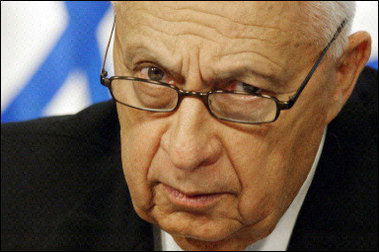|
Sharon in a 'very worrying' condition on the ninth day of coma
(AFP)
Updated: 2006-01-14 11:01
Israeli Prime Minister Ariel Sharon was reported to be in a "very worrying"
condition as he spent his ninth day in a medically-induced coma since suffering
a massive brain haemorrhage.
The prime minister has been in intensive
care since his collapse and three operations to stem bleeding in the brain,
leaving Israelis increasingly resigned to the likelihood that he will never
return to government.
|

Israeli Prime Minister Ariel Sharon, seen here in
January 2005, was reported to be in a "very worrying" condition as he
spent his ninth day in a medically-induced coma since suffering a massive
brain haemorrhage. [AFP] | The Hadassah
hospital in Jerusalem said Sharon remained in a "serious and stable" condition,
but he is yet to emerge fully from a deep coma, induced by medics in order to
rest his body.
Doctors have been slowly reducing levels of anaethesia but the 77-year-old
premier has yet to awaken.
Although a hospital spokesman dismissed reports of heightened concern,
Israeli public radio reported that Sharon's condition was "very worrying" as his
coma stretched on without an imminent end in sight.
"The situation is worrying, very worrying, even frightening," the radio
quoted medical sources as saying. "The moment of truth is approaching."
"It would need a miracle for Sharon to wake up from his deep coma and be able
to function in a way close to normal," the radio said, if Sharon showed no sign
of improvement after he stopped receiving anaesthetics.
According to tests carried out by doctors, the more time that passes without
a return to consciousness, no sign of waking up, opening his eyes or being able
to recognize his surroundings, the chances of a man of his age "functioning
normally again are very weak," the radio concluded.
Earlier, Hadassah spokesman Ron Krumer told AFP: "We have been worried from
the start, we continue to be and we are saying that his condition is serious."
He confirmed that Sharon had been in a coma for nine days, but stressed the
length of time such patients remained unconscious varied from case to case.
"We have expressed our concern since the beginning and we have not changed,"
he said.
In the last update before the start of the Jewish day of rest at sundown, he
said there had been "no change" in the premier's condition.
Doctors have given a series of upbeat medical reports following the initial
demise of a man many in Israel regarded as the ultimate strongman with a
near-infallible resilience.
Since being admitted to hospital on January 4 after suffering his second
stroke in about two weeks, the prime minister has gone through three bouts of
surgery to stem bleeding in his brain.
An opinion poll published in the mass selling Yediot Aharanot newspaper
revealed that an overwhelming 87 percent of those interviewed doubted Sharon
would ever return to his duties as prime minister.
Acting Prime Minister Ehud Olmert, who is now almost certain to lead Kadima
into the March 28 election, continues to enjoy high ratings in the poll, with
45.7 percent of respondents backing him, way ahead of his two main rivals.
But the acting premier lacks Sharon's charisma and faces a huge task in
navigating the security and political problems facing Israel, beginning with
this month's Palestinian parliamentary elections in which Islamic militant group
Hamas is taking part for the first time.
After talks with both Olmert and Palestinian leader Mahmud Abbas on Friday, a
visiting US envoy voiced backing for Arab residents of annexed east Jerusalem to
take part in the vote.
"The United States believes that the Palestinians should be able to vote
everywhere," assistant secretary of state for Near Eastern affairs David Welch
told reporters.
Israel is set to take a final decision on the issue Sunday but approval is
expected to be given following the resignation of four ministers from the
right-wing Likud, which opposes the move.
Abbas has threatened to cancel the whole election if the approval is not
forthcoming.
Welch renewed US criticism of the participation in the election of Hamas.
"The view of the US is that there should be no place in the political process
for groups and individuals who refuse to denounce terror and violence, who do
not recognise Israel's right to exist and refuse to disarm," he said.
Israel has already made clear that it will not allow campaigning in east
Jerusalem by Hamas, which has carried out the majority of attacks against Israel
in the past five years and refuses to recognise the Jewish state.
|